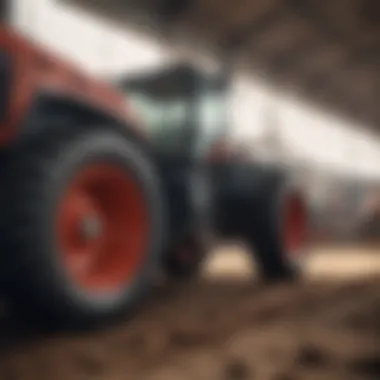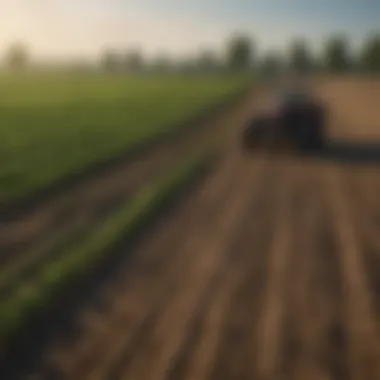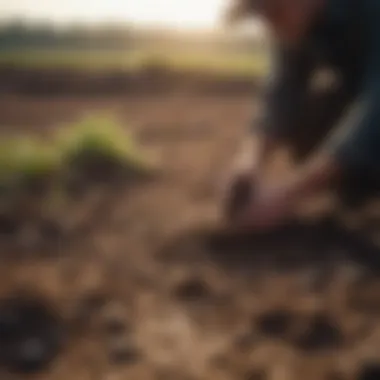Site Inspector Careers in Agriculture: Roles and Trends


Intro
Site inspector jobs in agriculture play a vital role in the modern agricultural landscape. The effectiveness of agricultural practices depends not only on the crops produced but also on the compliance and quality of the processes involved. These positions require a unique blend of technical knowledge, field experience, and an understanding of regulatory requirements. In this article, we will explore the intricacies of site inspector roles, the necessary skills, qualifications involved, and the essential nature of these jobs in ensuring sustainable agricultural practices.
Current Trends in Agriculture and Horticulture
As the agricultural sector evolves, it is critical to consider how these changes influence the role of site inspectors. The following trends are shaping the industry and directly affecting the responsibilities of inspectors.
Overview of Recent Innovations
Recent advancements in agriculture have introduced various technologies that aim to improve efficiency and yield. Precision farming is a leading innovation, utilizing satellite imagery and data analytics to make informed decisions about crop management. Site inspectors must be familiar with these technologies to evaluate their implementation. The integration of drone technology in monitoring crop health is another example. Inspectors often assess the effectiveness of these innovations and ensure they adhere to safety standards and agricultural codes.
Sustainable Practices Gaining Popularity
Sustainability has become a central theme within agriculture. Practices such as crop rotation, organic farming, and integrated pest management are gaining traction. Site inspectors are tasked with ensuring that these sustainable practices are not only adopted but also maintained. Understanding the impact of these techniques on soil health and biodiversity is crucial for inspectors. Notably, a significant increase in the demand for local produce has encouraged more sustainable farming methods, which site inspectors must stay informed about.
Essential Farming Techniques
A solid understanding of essential farming techniques is necessary for site inspectors. Their knowledge affects how well they can assess various practices and provide recommendations.
Soil Health Management
Healthy soil is the foundation of successful agriculture. Inspectors evaluate soil health by examining compaction, organic matter, and nutrient levels. Methods such as cover cropping and reduced tillage are often discussed in assessments. Experts recommend regular soil testing as part of a proactive approach to soil management.
Pest and Disease Control Strategies
Effective pest and disease management is key to maintaining crop yield. Site inspectors must be knowledgeable about both conventional and organic pest control methods. This includes integrated pest management practices, which combine biological, cultural, and chemical controls in an eco-friendly manner. Inspectors are critical in advising farmers on the most effective strategies while ensuring compliance with regulations.
Tools and Technology in Farming
The integration of cutting-edge tools and technology into agriculture has reshaped many traditional practices. Site inspectors must be well-versed in these developments.
Overview of Advanced Farming Tools
From GPS-guided tractors to automated irrigation systems, advanced tools are revolutionizing how farming is conducted. Understanding these tools allows inspectors to evaluate their usage effectively. Real-time monitoring systems now help in managing water usage and detecting crop deficiencies before they escalate.
Case Studies on the Use of Technology
Examining real-life examples of technology use in agriculture can further illustrate its impact. For instance, farmers deploying sensor technology to track moisture levels in soil have reported decreased water usage and enhanced crop yields. Site inspectors can learn from such case studies to apply critical evaluations to their work, ensuring farmers are optimizing resources.
"The intersection of technology and agriculture has the potential to transform practices, but the guidance of knowledgeable inspectors is essential to navigate these changes effectively."
For further details, you can explore links such as Wikipedia or Britannica.
Insights about current events can also be found on platforms like Reddit and Facebook.
Prelims to Site Inspector Jobs
Site inspector jobs in agriculture play a pivotal role in the optimization of farming practices and ensuring compliance with safety and regulatory standards. These positions are often overlooked but are integral for the sustainable development of the agricultural sector. Site inspectors evaluate various agricultural sites, ensuring that they meet specifications and regulations designed to protect both the environment and public health. Their work has implications for productivity, safety, and environmental stewardship.
Understanding the definition and historical context of site inspection in agriculture helps frame the significance of these roles. Site inspectors are essential in navigating the complexities of agricultural operations, utilizing their expertise to analyze crop management, soil health, water usage, and chemical application. This section will elucidate the functions and importance of site inspectors, illustrating how their efforts contribute to the broader goals of agricultural efficacy and sustainability.
Definition and Scope of Work
Site inspectors are professionals responsible for monitoring and evaluating agricultural sites. Their scope of work entails a broad range of activities, including site assessments, compliance checks with legal regulations, and advising farmers on best practices. They ensure that the agricultural processes adhere to safety protocols, environmental policies, and industry standards.
Typically, site inspectors engage in:
- Conducting on-site evaluations: They visit farms and agricultural facilities to assess compliance with laws and regulations.
- Data collection and analysis: Inspectors gather data on factors affecting crop health and productivity, such as soil quality, pest management, and irrigation systems.
- Reporting findings: They compile reports outlining compliance levels, safety issues, and recommendations for improvements. These reports are essential for farmers, helping them make informed decisions.


Historical Context of Site Inspection in Agriculture
The role of site inspectors in agriculture has evolved significantly over the years. Historically, inspection practices were informal, with observations made based on experience rather than systematic protocols. The increasing complexity of agricultural practices, rising environmental concerns, and the globalization of the food supply chain have necessitated a more structured approach to site inspection.
In the past few decades, regulations surrounding agriculture have intensified. This shift emerged in response to public demand for food safety, environmental protection, and sustainable practices. As a result, site inspection has transitioned from a peripheral activity to a cornerstone of modern agricultural operations. With advancements in technology, inspectors now utilize tools like GPS and remote sensing to enhance their evaluations. This evolution reflects a growing recognition of the importance of site inspection in achieving efficient agricultural production while safeguarding environmental integrity.
"The role of site inspectors is fundamental to balancing agricultural productivity with environmental responsibility."
In summary, site inspector jobs in agriculture are vital for ensuring compliance and sustainability. The defined scope of work and the historical context underscore their importance in today's agricultural landscape, paving the way for improved practices and better outcomes for farmers and the environment.
Roles and Responsibilities
The roles and responsibilities of site inspectors in agriculture are fundamental to the effectiveness and sustainability of farming practices. Site inspectors serve as critical links between theory and practice, ensuring that regulations are adhered to while also offering insights that can lead to improved agricultural outcomes. Their work encompasses various aspects, from preliminary site assessments to ensuring compliance with environmental regulations. Understanding these roles is essential for grasping how site inspectors contribute to both the agriculture industry and broader environmental stewardship.
Site Assessment Procedures
Site assessment procedures involve a detailed analysis of agricultural land to determine its suitability for various types of farming activities. Inspectors follow systematic protocols to evaluate factors such as soil quality, drainage capacity, and crop compatibility. This assessment process is crucial for making informed decisions about land use.
Inspectors often utilize specific tools and methods during these assessments. For example, soil testing kits help evaluate nutrient levels, while moisture meters gauge soil hydration. Additionally, aerial imaging technologies allow for more comprehensive landscape analysis. Based on their findings, site inspectors provide recommendations aimed at optimizing agricultural practices while fostering sustainability.
Collaboration with Farmers and Agronomists
Collaboration with farmers and agronomists is another vital responsibility of site inspectors. Establishing effective communication with these stakeholders cultivates a strong partnership and can lead to enhanced agricultural practices. Building trust and rapport allows inspectors to convey crucial information about regulatory compliance and best practices in an approachable manner.
Farmers possess intimate knowledge of their land and crops, while agronomists provide scientific insight into crop management. Site inspectors act as facilitators, helping to bridge the gap between the two. Through workshops, site visits, and regular meetings, they can share expertise and gather valuable feedback. This collaborative effort not only improves compliance with regulations but also fosters innovation in farming techniques.
Compliance Inspection and Reporting
Compliance inspections and reporting are integral to the role of site inspectors in agriculture. They ensure that farming practices align with local, state, and federal regulations designed to protect the environment and public health. Inspectors conduct regular inspections to verify adherence to these standards, scrutinizing practices related to pesticide application, water resource management, and waste disposal.
Upon completion of these inspections, site inspectors must compile detailed reports outlining their findings. These reports are vital for maintaining compliance and can serve as formal records for regulatory agencies. Effective communication of findings can lead to immediate corrective actions if violations are identified, thus protecting the ecosystem from potential harm.
In summary, the responsibilities of site inspectors in agriculture span several critical areas, ensuring that agricultural practices are not only effective but also compliant with established regulations.
Required Qualifications and Skills
The site inspector role in agriculture demands a unique blend of qualifications and skills. This ensures that the individual can effectively assess agricultural sites, enhance compliance with safety regulations, and contribute to sustainable farming practices. Understanding the qualifications required for this profession is crucial for those seeking to enter the field. It not only provides clarity on what is expected but also helps in identifying pathways for development within the industry.
Educational Background
A solid educational foundation is essential for site inspectors in agriculture. Most positions require at least a bachelor's degree in agronomy, environmental science, agricultural engineering, or a related field. This educational background equips individuals with the theoretical knowledge and practical insights necessary for site inspections.
In addition to a degree, attending workshops, seminars, or courses that focus on agricultural regulations and sustainability can greatly enhance one’s profile. Many colleges and universities also offer specialized programs that focus on environmental compliance, which is increasingly important in today’s agricultural landscape.
Technical and Analytical Skills
Technical and analytical skills are pivotal for site inspectors. These individuals need to conduct thorough assessments of agricultural sites, which involves understanding various technical standards. Knowledge of soil science, crop management, and environmental impact assessments is vital.
Analytical skills are equally important as inspectors must synthesize information from various sources. They often utilize software tools for reporting and data analysis. Familiarity with Geographic Information Systems (GIS) or other data management tools can set candidates apart in the job market.
Communication and Interpersonal Skills
In the field of agriculture, site inspectors regularly interact with farmers, agronomists, and regulatory bodies. Thus, effective communication and interpersonal skills are crucial. Inspectors must clearly convey findings and recommendations to stakeholders, often translating complex technical language into easily understandable terms.
Building rapport with farmers and other stakeholders helps foster a cooperative environment. Good interpersonal skills can facilitate productive discussions about compliance, safety protocols, and sustainability practices. This collaboration is key to the successful implementation of agricultural regulations and best practices.
"The blend of technical knowledge and strong communication skills enables site inspectors to bridge the gap between regulations and practical applications on farms."


In summary, the required qualifications and skills for site inspectors in agriculture encompass a comprehensive educational background, strong technical analytical capabilities, and excellent communication skills. These elements not only enhance individual effectiveness but also contribute to the betterment of agricultural practices as a whole.
Career Pathways
Understanding career pathways is essential for understanding progression within site inspector roles in agriculture. These pathways not only outline the steps one can take from entry-level positions to higher roles, but also illustrate the potential for specialization and growth in this field.
Identifying clear career pathways allows individuals to set concrete goals and take intentional actions towards their desired professional outcomes. Each level within the career spectrum offers unique experiences and skills necessary for further advancement.
Entry-Level Positions
Entry-level positions serve as foundational roles for aspiring site inspectors in agriculture. These positions typically require a basic knowledge of agricultural practices, understanding of regulatory compliance, and some field experience. A common entry-level job is that of a field technician. Job seekers may find opportunities at agricultural firms, government agencies, or consulting companies.
In these roles, new inspectors work alongside experienced professionals to understand the protocols of site inspections. Tasks often include:
- Conducting preliminary site assessments
- Assisting in documentation and reporting
- Engaging with farmers to gather pertinent information
Such positions not only provide necessary experience but also allow for networking with other agricultural professionals, which is crucial for future job prospects.
Advancing to Senior Roles
Progressing to senior roles marks a significant achievement in the career of a site inspector. These positions require advanced understanding of both agricultural policies and site inspection methodologies. Job titles like senior site inspector or inspection manager often represent these advanced roles.
Advancement typically hinges on a combination of experience, performance, and further education. Those in senior positions take on responsibilities such as:
- Overseeing junior inspectors
- Developing comprehensive inspection plans
- Conducting detailed compliance evaluations
- Managing complex stakeholder interactions
Furthermore, senior roles often involve strategic thinking and leadership skills, as these inspectors must align with organizational objectives while ensuring adherence to regulations. Mastery of interpersonal communications becomes vital, particularly when negotiating between farmers and regulatory bodies.
Specialization Opportunities
The agricultural sector is continually evolving, leading to various specialization opportunities for site inspectors. Areas of expertise can enhance the value of an inspector, making them indispensable in specific contexts. Some common specializations include:
- Environmental Compliance: Focused on understanding and adhering to environmental regulations affecting agricultural practices.
- Organic Certification: Inspectors can specialize in evaluating and certifying organic farms, which requires in-depth knowledge about organic standards.
- Irrigation Management: Some inspectors concentrate on the evaluation of irrigation systems and practices, which is crucial given the importance of water management in agriculture.
These specializations often lead to higher earning potential and increased job satisfaction. Each path allows inspectors to contribute in targeted ways to the agricultural industry’s success.
Industry Trends Affecting Site Inspector Jobs
The landscape of agriculture is continually changing, influenced by a multitude of factors that shape how site inspection roles operate. For those involved in agricultural practices, understanding these industry trends is vital. They can directly influence job responsibilities, create new opportunities, and redefine the skill sets required for site inspectors. Identifying these trends not only aids in preparing individuals for future roles but also enhances the overall effectiveness of agricultural operations.
Technological Advancements
Advancements in technology have transformed the agricultural sector. The use of drones, remote sensing, and precision agriculture are becoming common tools for site inspectors. Drones facilitate aerial surveys that offer real-time data on crops and soil conditions. With these innovations, site inspectors can work more efficiently, collecting detailed observations without being limited by terrain or weather conditions.
Additionally, agricultural software tools allow for the analysis of massive amounts of data. Inspectors can assess trends over time and measure the effectiveness of various agricultural practices. This data-driven approach enhances decision-making processes. Inspectors who are adept at utilizing these technologies tend to be more effective in their roles, creating a greater demand for candidates with tech-savvy skills.
Regulatory Changes
Regulatory frameworks governing agricultural practices are evolving swiftly, influenced by concerns such as food safety, environmental impacts, and labor standards. Site inspectors must stay informed about these regulatory updates to ensure compliance during inspections. Changes to these regulations often lead to new responsibilities for inspectors, necessitating ongoing education and training.
Moreover, failure to comply with regulations can have severe ramifications for agricultural operations, resulting in penalties or shutdowns. As such, site inspectors play a critical role in ensuring that farms adhere to national and local regulations. Staying abreast of these changes is essential not only for compliance but also for enhancing the reputation and sustainability of agricultural businesses.
Sustainability Practices
Sustainability has become a driving force in agriculture, influencing both consumer behavior and regulatory policies. Farmers are increasingly adopting practices that promote environmental conservation. Site inspectors are crucial in evaluating and advising on sustainable practices such as crop rotation, organic farming, and water conservation techniques.
Understanding sustainable practices allows site inspectors to contribute meaningfully to the agriculture sector. For instance, they can guide farmers in implementing methods that reduce environmental impact while still ensuring high productivity. As sustainability becomes a significant factor for consumers, inspectors who can advise on these practices will become even more valuable in the agricultural workforce.


"The nexus of technology, regulation, and sustainability highlights the essential role site inspectors play in modern agriculture."
In summary, the trends affecting site inspector jobs highlight the importance of continuous learning and adaptation. As technology advances and regulations evolve, site inspectors must remain agile. Embracing these changes will ensure they can adequately support agricultural practices and enhance their careers.
Impact of Site Inspection on Agricultural Practices
Site inspection plays a pivotal role in shaping modern agricultural practices. It ensures that the land and practices being employed adhere to safety and regulatory standards that protect both the environment and the agricultural workforce. This section outlines how site inspections enhance agricultural safety and sustainability, resulting in a healthier ecosystem and improved productivity.
Enhancing Safety Protocols
Safety is a primary concern in agriculture. Site inspectors are tasked with reviewing operational procedures and assessing potential hazards that may affect workers and the surrounding environment. They evaluate equipment, chemicals, and machinery, ensuring they are used correctly and maintained properly.
- Assessment of Equipment: Site inspectors examine farming machinery to ensure it meets safety standards. Ensuring that equipment is functioning correctly reduces the risk of accidents and injuries on the farm.
- Chemical Handling: Agricultural chemicals can be hazardous. Inspectors provide guidance on proper storage, usage, and disposal of these substances. By following these protocols, farms minimize the chance of chemical spills and accidents, safeguarding both the workers and the community.
- Emergency Preparedness: Site inspections often include a review of emergency response plans. By evaluating these plans, inspectors help to ensure that farms are prepared for unforeseen events, such as equipment failures or natural disasters.
"Effective site inspections lead to safer working conditions, thereby decreasing the number of agricultural accidents each year."
Fostering Sustainable Practices
Sustainability is increasingly critical in agriculture. Site inspectors are essential in promoting practices that protect the environment while also maintaining productivity. Their evaluations encourage farmers to implement changes that reduce the ecological impact of their practices.
- Soil Health Preservation: Inspectors assess soil management practices to ensure they maintain soil health. This includes evaluating crop rotation schedules and organic matter use.
- Water Usage Efficiency: Inspectors review irrigation systems, promoting methods that conserve water resources. Efficient water use is essential as it addresses agricultural demands while protecting local ecosystems.
- Biodiversity Promotion: Site inspectors often advise on strategies that promote biodiversity, such as planting cover crops or creating buffer zones. These strategies help to maintain a balanced ecosystem which is essential for long-term agricultural success.
Challenges Faced by Site Inspectors
Site inspectors in the agricultural sector play a critical role in maintaining standards and ensuring compliance with regulations. However, this position comes with its own set of challenges that can impact job performance and outcomes in the field. Recognizing these challenges is vital for understanding the overall effectiveness of site inspection. By addressing potential difficulties, site inspectors can better prepare for their roles and make meaningful contributions to agricultural practices. This section will discuss two significant challenges: environmental conditions and interactions with diverse stakeholders.
Environmental Conditions
Environmental conditions can heavily influence the work of site inspectors. Inspectors often operate in various climates, terrains, and weather patterns that can affect both accessibility and site assessments. For example, extreme weather like heavy rainfall or drought can limit the ability to inspect certain areas thoroughly. Additionally, inspectors must be equipped to navigate different seasons, which could impact crop conditions and project timelines.
The physical demands of inspections in challenging environments may also pose risks. Long hours spent outdoors in adverse conditions can lead to fatigue and reduced performance. Inspectors must adopt strategies to mitigate these risks, such as wearing appropriate protective gear and managing time effectively.
Furthermore, the risk of accidents due to unpredictable environmental factors adds another layer of complexity. Site inspectors should remain vigilant and aware of their surroundings, especially when evaluating sites with varying terrains. Developing robust safety protocols can help reduce accidents and ensure inspections are conducted efficiently. To summarize, environmental conditions not only influence the practical aspects of site inspections but also necessitate effective preparation and adaptability.
Interactions with Diverse Stakeholders
Interactions with diverse stakeholders present another significant challenge for site inspectors. Site inspectors frequently collaborate with farmers, agronomists, regulatory bodies, and other professionals. Each of these groups has its own set of priorities, expectations, and communication styles. Navigating these differences can create tension and complicate the inspection process.
Effective communication is critical in building rapport with various stakeholders. Site inspectors need to communicate regulations clearly while also being receptive to the perspectives of farmers. A lack of understanding or miscommunication can lead to conflicts, which ultimately may hinder project progress.
Moreover, differing opinions about best practices can complicate relationships. Stakeholders may have entrenched beliefs about agricultural practices that conflict with regulatory expectations. Site inspectors must be adept at mediation, recognizing and addressing concerns without compromising compliance standards.
Understanding the dynamics of interactions with various stakeholders is essential for promoting successful site inspections. By fostering positive relationships, inspectors can enhance collaboration and foster compliance within the agricultural sector.
Future Outlook for Site Inspection Careers
The future of site inspection careers in agriculture is promising and multifaceted. As the agriculture sector faces new challenges and opportunities, site inspectors play crucial roles. Their work not only impacts compliance but also contributes to the optimization of agricultural practices. Understanding the growth projections and evolving roles of site inspectors helps stakeholders align their strategies in this industry.
Growth Projections
Recent studies indicate a steady increase in the demand for site inspectors in agriculture. Factors driving this growth include:
- Increased Agricultural Production: As farmers strive to meet the demand for food worldwide, theneed for effective project management and compliance grows.
- Technological Integration: The adoption of precision agriculture and smart farming tools is expanding. Site inspectors must adapt to these changes, ensuring practices comply with safety and environmental standards.
- Policy Changes: Governments are implementing stricter regulations regarding food safety and environmental protection. Site inspectors are essential to navigate these regulatory frameworks.
Overall, growth projections suggest that the demand for skilled site inspectors will continue to rise, reflecting the sector's complexity and the need for oversight.
Evolving Role in Agriculture
The role of site inspectors is changing with the agricultural landscape. Here are key aspects of this evolution:
- Adapting to New Technologies: Site inspectors are now required to understand advanced farming technologies and methodologies. This includes knowledge of drone use, soil sensors, and data analytics software.
- Focus on Sustainability: With growing concerns about climate change, site inspectors are increasingly tasked with ensuring sustainable practices. This role includes verifying that farms are using resources efficiently and reducing waste.
- Proactive Collaboration: Interactions with farmers, agronomists, and policymakers are becoming more collaborative. Updating protocols and sharing insights helps drive improvements and innovation.
The evolving role of site inspectors is critical. They ensure that agricultural operations not only comply with regulations but also contribute positively to the environment, which is vital for the future of food production.
"Site inspection is not just about compliance; it is about participating in a larger vision for sustainable agriculture." - Expert Commentator



